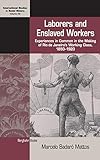Laborers and Enslaved Workers : Experiences in Common in the Making of Rio de Janeiro's Working Class, 1850-1920 / Marcelo Badaró Mattos.
Material type: TextSeries: International Studies in Social History ; 29Publisher: New York ; Oxford : Berghahn Books, [2017]Copyright date: ©2017Description: 1 online resource (186 p.)Content type:
TextSeries: International Studies in Social History ; 29Publisher: New York ; Oxford : Berghahn Books, [2017]Copyright date: ©2017Description: 1 online resource (186 p.)Content type: - 9781785336294
- 9781785336300
- online - DeGruyter
| Item type | Current library | Call number | URL | Status | Notes | Barcode | |
|---|---|---|---|---|---|---|---|
 eBook
eBook
|
Biblioteca "Angelicum" Pont. Univ. S.Tommaso d'Aquino Nuvola online | online - DeGruyter (Browse shelf(Opens below)) | Online access | Not for loan (Accesso limitato) | Accesso per gli utenti autorizzati / Access for authorized users | (dgr)9781785336300 |
Frontmatter -- CONTENTS -- TABLES AND MAPS -- PREFACE TO THE ENGLISH EDITION -- INTRODUCTION -- CHAPTER ONE WORK, URBAN LIFE, AND THE EXPERIENCE OF EXPLOITATION -- CHAPTER TWO FORMS OF ORGANIZATION -- CHAPTER THREE RESISTANCE AND STRUGGLE -- CHAPTER FOUR CONSCIOUSNESS -- CONCLUSION -- REFERENCES -- INDEX
restricted access online access with authorization star
http://purl.org/coar/access_right/c_16ec
From the middle of the nineteenth century until the 1888 abolition of slavery in Brazil, Rio de Janeiro was home to the largest urban population of enslaved workers anywhere in the Americas. It was also the site of an incipient working-class consciousness that expressed itself across seemingly distinct social categories. In this volume, Marcelo Badaró Mattos demonstrates that these two historical phenomena cannot be understood in isolation. Drawing on a wide range of historical sources, Badaró Mattos reveals the diverse labor arrangements and associative life of Rio’s working class, from which emerged the many strategies that workers both free and unfree pursued in their struggles against oppression.
Mode of access: Internet via World Wide Web.
In English.
Description based on online resource; title from PDF title page (publisher's Web site, viewed 25. Jun 2024)


